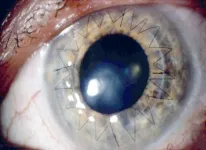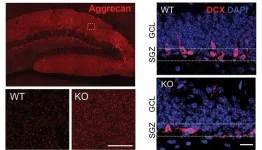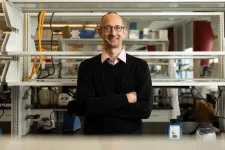(Press-News.org) EMBARGOED: Not for Release Until 00:01 AM (UK Time) on Friday 3 November 2023
New research highlights the need for routine discussions about eye donation in end-of-life care clinical settings
Less than four per cent of eligible patients in end-of-life care settings were asked to consider eye donation
Patients had positive views about eye donation, but most did not know it could be an option for them
Staff need training and guidance to support discussing eye donation with patients
A new study has found there is significant scope to increase the number of eye donations from patients cared for in hospice and palliative care settings - donations which are desperately needed for sight-restoring surgeries.
Researchers from the University of Southampton and clinical partners, including NHS Blood and Transplant, carried out the study, which has been funded by the National Institute for Health and Care Research (NIHR). It found just a small fraction of eligible patients in hospice and palliative care settings are being approached to consider the option of eye donation. This is despite both healthcare professionals and patients having favourable views towards it.
The researchers say practice needs to change so that patients who wish to donate are being offered the opportunity as a part of routine end-of-life care.
Demand for eye tissue
Over two million people in the UK are living with sight loss, taking a huge toll on their lives and costing the economy a reported £4.34 billion each year. Some conditions, such as Keratoconus and Fuchs’ Corneal Dystrophy, can be treated with surgery which removes all or part of a damaged cornea and replaces it with healthy donor tissue (corneal transplant). But there is a shortfall in the supply of donor tissue needed for operations.
NHS Blood and Transplant aims to achieve a weekly stock of 350 eyes for use in surgery or research. But from April 2021 to March 2022, only 88 eyes on average were donated per week.
The RNIB predicts that by 2050, the number of people with sight loss will double to nearly four million (mainly due to the ageing population), further increasing the demand for eye tissue. Each donor can help restore or improve the sight of up to 10 people.
‘Many potential donors’
Clinical partners across England reviewed the case notes of 1,199 deceased patients in three hospice care and three hospital-based palliative care services.
Although 46 per cent of patients were eligible to donate their eyes, less than 4 per cent of potential donors had been approached or referred for eye donation.
Views on donation
To understand attitudes and potential barriers to eye donation, the researchers interviewed over 100 healthcare professionals and over 60 patients and carers receiving palliative care. They also conducted a national survey of 156 service providers.
Dr Tracy Long-Sutehall, Associate Professor at the University of Southampton and lead author of the research which has been published today [3 November] in the Health and Social Care Delivery Research Journal, says:
“Many patients and carers were not aware of eye donation being an option for themselves or their relative. Those we spoke to generally had positive views about eye donation and were open to being asked about their preferences. This suggests there could be many potential donors in hospice and palliative care settings who are willing to donate their eyes after their death so that others might see.”
Knowledge gap
Healthcare professionals were in favour of eye donation being discussed as part of end-of-life care planning but had gaps in their knowledge around eligibility criteria and processes for referral; more than half had received no formal training regarding eye donation. As such, the majority had never, or hardly ever, initiated a discussion about eye donation with patients or family members.
Dr Long-Sutehall added: “Conversations around eye donation need to be sensitively managed, so it’s understandable that healthcare professionals would be reluctant to raise it if they haven’t had suitable training and education.”
Future opportunities
The study demonstrates that there is significant potential for more patients to be given the opportunity to donate their eyes in the future, and for eye donation to be embedded in routine end-of-life care clinical practice.
Emma Winstanley, Lead Nurse for Tissue and Eye Services at NHS Blood and Transplant who was a co-applicant on the study, says:
“This research provides crucial new insight to better understand both patient and healthcare staff views on eye donation. With more patients dying outside of traditional hospital settings, either at home or in hospices, it is essential that patients have the opportunity to donate whenever donation is possible. Eye donation is particularly special as donation can even be possible for patients who have cancer. We know that many patients and families take great comfort and pride from donation. By working closely with hospice colleagues, we can enable more patients to donate and more life-transforming surgeries to take place.”
The researchers highlight several implications for service development, healthcare practice and recommendations for further research, including the evaluation of a Support Toolkit for Eye donation in Palliative care Settings (STEPS) developed by the research team.
Eye Donation from Palliative and Hospice care contexts: the EDiPPPP mixed methods study was funded by the NIHR Health and Social Care Delivery Research programme.
Ends
Contact
Steve Williams, Media Relations, University of Southampton press@soton.ac.uk or 023 8059 3212.
Notes for editors
Eye Donation from Palliative and Hospice care contexts: the EDiPPPP mixed methods study is published in the Health and Social Care Delivery Research Journal and is available to download here: Eye donation from palliative and hospice care contexts: the EDiPPPP mixed-methods study (nihr.ac.uk)
Interview opportunities
Dr Tracy Long-Sutehall, Associate Professor at the University of Southampton and lead investigator on the EDiPPPP study. (Southampton)
Dr Sarah Mollart Consultant in Palliative Medicine at St Nicholas Hospice and clinical investigator on the EDiPPPP study. (Bury St Edmunds, Suffolk)
Laura – Mum of two who has had two corneal transplants for an undiagnosed illness. This has allowed her to see her children grow up. Her mother has also had a corneal transplant. (London)
Angie – Hospice nurse who made the decision (along with her mum and sister) to donate her father William’s corneas, kidneys and heart valves. The hospice she works at promotes discussion about organ donation (including corneas). (Wolverhampton)
Images available to download here: https://safesend.soton.ac.uk/pickup?claimID=ANs4m4SFgmFFfuBh&claimPasscode=a9JAjbHmcAcnCzcC
Placido disk reflected off eye with keratoconus - Credit National Keratoconus Foundation
Eye after cornea transplant - Credit NHS Blood and Transplant
Additional information
The University of Southampton drives original thinking, turns knowledge into action and impact, and creates solutions to the world’s challenges. We are among the top 100 institutions globally (QS World University Rankings 2023). Our academics are leaders in their fields, forging links with high-profile international businesses and organisations, and inspiring a 22,000-strong community of exceptional students, from over 135 countries worldwide. Through our high-quality education, the University helps students on a journey of discovery to realise their potential and join our global network of over 200,000 alumni. www.southampton.ac.uk
www.southampton.ac.uk/news/contact-press-team.page
Follow us on twitter: https://twitter.com/UoSMedia
About the National Institute for Health and Care Research (NIHR)
The mission of the National Institute for Health and Care Research (NIHR) is to improve the health and wealth of the nation through research. We do this by:
Funding high quality, timely research that benefits the NHS, public health and social care;
Investing in world-class expertise, facilities and a skilled delivery workforce to translate discoveries into improved treatments and services;
Partnering with patients, service users, carers and communities, improving the relevance, quality and impact of our research;
Attracting, training and supporting the best researchers to tackle complex health and social care challenges;
Collaborating with other public funders, charities and industry to help shape a cohesive and globally competitive research system;
Funding applied global health research and training to meet the needs of the poorest people in low and middle income countries.
NIHR is funded by the Department of Health and Social Care. Its work in low-and-middle-income countries is principally funded through UK Aid from the UK government.
END
Study reveals untapped potential to increase eye donations needed for sight-restoring surgeries
2023-11-03
ELSE PRESS RELEASES FROM THIS DATE:
Penn Medicine researchers develop gene editing approaches for phenylketonuria treatment
2023-11-02
PHILADELPHIA— Phenylketonuria (PKU) is a rare newborn genetic disease that impacts between 1 in 10,000 to 1 in 20,000 people, depending on the individuals’ genetic ancestry. PKU causes an amino acid—called phenylalanine (Phe)—to build up in the bloodstream. Uncontrolled PKU can lead to intellectual disability, psychiatric issues, and seizures. While current therapies can partially improve outcomes, they require meticulous, lifelong compliance that is very difficult for most patients. ...
Mount Sinai researchers detail mechanism of a key protein implicated in age-related brain dysfunction
2023-11-02
Mount Sinai researchers have shed valuable light on the mechanism of a key protein that regulates the plasticity and function of the hippocampus, a key brain region involved in memory and learning, and that decreases with age in mice.
The team’s findings, published in Molecular Psychiatry, could pave the way for a better understanding of how the protein, known as tissue inhibitor of metalloproteinases 2 (TIMP2), could potentially be targeted in age-related disorders like Alzheimer’s disease to help restore ...
UH researcher tackles mysterious Z-RNA structure and its potential connection to diseases
2023-11-02
University of Houston Assistant Professor of Biology and Biochemistry Quentin Vicens has been awarded a $1.2 million grant from the National Institute of General Medical Sciences to unravel the mystery of Z-RNA – an enigmatic RNA structure within our cells that plays a critical role in immune response. This work is in collaboration with the laboratory of Beat Vögeli, associate professor at the University of Colorado and co-recipient of the award.
Vicens, Vögeli and their research teams are on a mission to understand how Z-RNA forms, how often it appears in our genetic material and what it means for ...
Different antibiotics’ effects on gut microbes may impact hypertensive organ damage
2023-11-02
Highlights
In a preclinical study, altering the intestinal microbiome with narrow-spectrum antibiotics affected organ damage associated with hypertension.
Results from the study will be presented at ASN Kidney Week 2023 November 1–November 5.
Philadelphia, PA (November 2, 2023) — New research in rodents indicates that altering gut microbes may affect the development of organ damage associated with hypertension. The findings will be presented at ASN Kidney Week 2023 November 1–November ...
Are sodium-glucose cotransporter-2 inhibitors safe for patients with diabetes and cancer?
2023-11-02
Highlights
Investigators found that in patients with diabetes and cancer, sodium glucose cotransporter-2 inhibitors were associated with a higher risk of diabetic ketoacidosis and fracture and a lower risk of acute kidney injury and urinary tract infection compared with glucagon-like peptide 1 receptor agonists.
Results from the study will be presented at ASN Kidney Week 2023, November 1–November 5.
Philadelphia, PA (November 2, 2023) — Sodium-glucose cotransporter-2 inhibitors (SGLT2i) have heart- and kidney-related benefits for patients with and without diabetes ...
Wildfire air pollution may increase risks of hospitalization and death among patients on dialysis
2023-11-02
Highlights
Among individuals receiving in-center hemodialysis treatment in Washington, Oregon, and California, exposure to wildfire-related air pollution was associated with elevated risks of hospitalization and mortality.
Results from the study will be presented at ASN Kidney Week 2023 November 1–November 5.
Philadelphia, PA (November 2, 2023) — In analyses of data from western US states, increases in wildfire-related air pollution around dialysis clinics were linked to higher rates of hospitalizations and deaths among patients. The research will be presented at ASN Kidney Week 2023 ...
Simple automated tool prompts physicians to screen patients with diabetes for kidney disease
2023-11-02
Highlights
A tool that provides an automated prompt to physicians increased kidney disease screening in patients with type 2 diabetes.
Results from the study will be presented at ASN Kidney Week 2023 November 1–November 5.
Philadelphia, PA (November 2, 2023) — Investigators have implemented an automated health maintenance tool created by the National Kidney Foundation into electronic medical records to prompt primary care physicians to screen for chronic kidney disease (CKD) in adult patients ...
FSU researchers capture high-resolution images of magnesium ions interacting with CRISPR gene-editing enzyme
2023-11-02
The gene-editing technology known as CRISPR has led to revolutionary changes in agriculture, health research and more.
In research published in Nature Catalysis, scientists at Florida State University produced the first high-resolution, time-lapsed images showing magnesium ions interacting with the CRISPR-Cas9 enzyme while it cut strands of DNA, providing clear evidence that magnesium plays a role in both chemical bond breakage and near-simultaneous DNA cutting.
“If you are cutting genes, you don’t want to have only one strand of DNA broken, because the cell can repair it easily without editing. You want both strands to be broken,” said Hong ...
Online grocery shopping promotes less variety, fewer impulse buys
2023-11-02
ITHACA, N.Y. – Online grocery carts tend to include less variety and fewer fruits and vegetables than those in a trip to a brick-and-mortar supermarket – but online shoppers are less susceptible to unhealthy impulse buys, according to a new Cornell University study.
In an analysis of nearly 2 million shopping trips, the researchers found that within a given household, Instacart baskets are more similar to each other from week to week than in-store carts, with more than twice as many overlapping items between successive trips to the same retailer.
Nutritionally, however, ...
Can AI help boost accessibility? These researchers tested it for themselves
2023-11-02
Generative artificial intelligence tools like ChatGPT, an AI-powered language tool, and Midjourney, an AI-powered image generator, can potentially assist people with various disabilities. These tools could summarize content, compose messages or describe images. Yet the degree of this potential is an open question, since, in addition to regularly spouting inaccuracies and failing at basic reasoning, these tools can perpetuate ableist biases.
This year, seven researchers at the University of Washington conducted a three-month autoethnographic study — drawing on their own experiences as people with and without disabilities — to test AI tools’ utility for accessibility. Though ...





